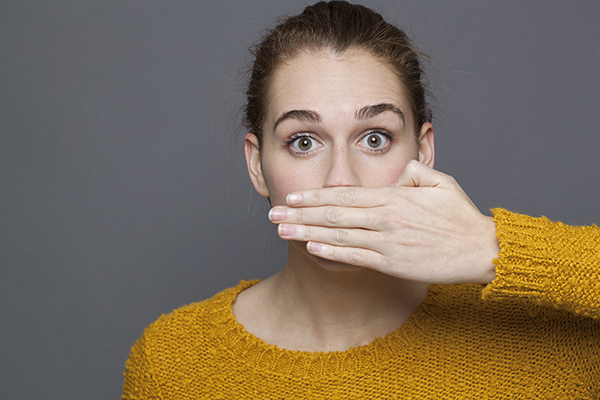




Q: It’s been brought to my attention that I have persistent bad breath – but I don’t know what is causing it, or what I can to do remedy it.
Can you tell me what might be causing the problem, and what steps I can take to fix it?
A: Bad breath, or halitosis, is most often caused by a buildup of bacteria in the mouth specifically on the surface of the tongue, the throat and tonsils, which give off noxious odors. If regular flossing, brushing and rinsing doesn’t take care of it, it may be chronic.
Halitosis is the third most common reason individuals seek dental care, the first two being tooth decay and gum disease. This is apropos because most cases of chronic halitosis are due to poor dental hygiene. Untreated tooth decay and periodontal disease encourage the growth of bacteria that often hide in pockets around gums and in cavities.
Dry mouth is a common cause of bad breath—whether from taking antihistamines and/or certain prescription medications or not drinking enough water. But before you reach for mouthwash, beware that most mouthwash preparations contain alcohol which is also very drying to the mouth. Moreover, alcohol-based mouthwashes destroy beneficial bacteria in the mouth—part of a healthy microbiome—allowing opportunistic bacteria to grow.
Acid reflux and GERD can cause halitosis by allowing acid to enter the esophagus and gases to escape to the mouth. A rare condition known as Zenker’s diverticulum may also contribute to bad breath due to food retention in the esophagus.
Sinusitis can contribute to halitosis. Exhaling via the nose can have a pungent odor arising from bacteria and infection. And the post-nasal drip associated with chronic rhinosinusitis contributes to the buildup of anaerobic bacteria on the back of the tongue, causing bad breath.
If you wear dentures, don’t wear them overnight. Remove and clean them nightly to rid bacteria and food particles.
Barring any of these circumstances or conditions, you may want to take it easy on the onions and garlic which can cause sulfur-smelling breath. To help neutralize your breath, nibble daily on some parsley, celery and cucumbers, and sip some green tea.
To your health!
Though we think of declining estrogen as the hallmark of menopause, it's actually common for…

Up to 12 percent of Americans have ulcers at some point in life. Peptic ulcers…
Gallbladder disease is a modern illness. An estimated 20 million Americans have gallbladder disease. The…

This past week we were regaled with headlines like: High levels of niacin may increase…

March is National Nutrition Month and, needless to say, good nutritious food is essential to…

I recently attended the Integrative Healthcare Symposium (IHS), an annual conference held here in Manhattan. The…

Exploring the Healing Power of Herbs with Dr. Bill Rawls, Part 1

Our virtual voicemail is open 24/7, so there's no need to wait to submit your questions for Dr. Hoffman. Leave a message, and you may hear your question featured on the Intelligent Medicine radio program!